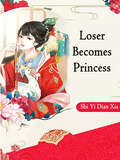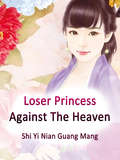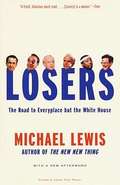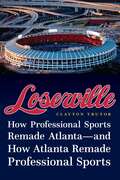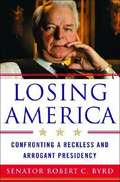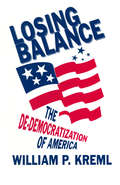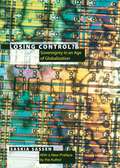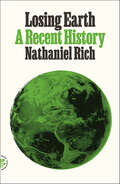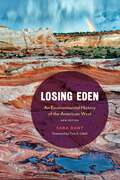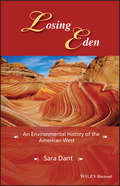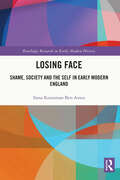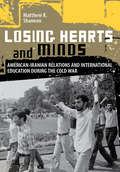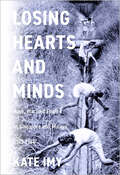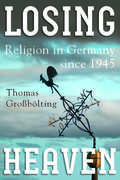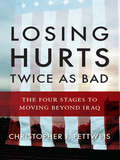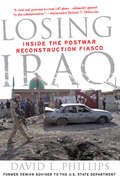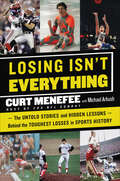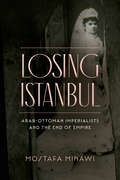- Table View
- List View
Loser Becomes Princess: Volume 5 (Volume 5 #5)
by Shi YiDianXiaTranscending from another world to become a trash!Surrender to a beautiful man and become the sovereign imperial concubine!
Loser Princess Against The Heaven: Volume 1 (Volume 1 #1)
by Shi YiNianGuangMangWhen the Mu Rong family's dead Sixth Miss meets the rebirth of a modern special agent Murong Youyi.others will hit me 10 times more than I will! Reject the prince, fight the little sister, the head of the family! He wanted to tell them that sooner or later, they would have to pay him back!
Loser Princess Against The Heaven: Volume 2 (Volume 2 #2)
by Shi YiNianGuangMangWhen the Mu Rong family's dead Sixth Miss meets the rebirth of a modern special agent Murong Youyi.others will hit me 10 times more than I will! Reject the prince, fight the little sister, the head of the family! He wanted to tell them that sooner or later, they would have to pay him back!
Loser's Corner
by Antonin VarenneParisian street cop and amateur boxer George "The Wall" Crozat is racking up an impressive knockout record in the world of underground boxing. Failing to translate his small-time boxing success into a decent source of income, however, and unable to finance his nasty prostitution habit with his meager earnings as a police officer, he contemplates a drastic career change. Finally, unable to resist a tempting offer to make some cash using his fists as en enforcer, he unwittingly becomes a pawn in a very dangerous game. Meanwhile, we learn the unsettling story of the young socialist Pascale Verini, exiled to the Algerian front during the 1957 Algerian War. As soon as he gets to Algeria, Verini is transferred to a nightmare "farm" in deepest Sahara, where North African prisoners of war are mercilessly tortured and killed by the French, away from prying eyes and ears. Prix Quais du Polar winner Antonin Varenne draws on his father's experiences of France's colonialist past to illuminate one of the darkest pages of France's colonial history, even as he details the grim reality of being a beat cop in present-day Paris. The result is a darkly personal, elegantly gritty tale of conspiracy, torture, corruption, and revenge.
Loser's Corner
by Antonin Varenne2008. George 'The Wall' Crozat has racked up thirty-eight victories (twenty-three of them by knock-out), eight defeats, and an empty bank account. Finally ready to hang up the gloves and focus on his career as a police officer, his chief concern is how to fund his prostitution habit. When a shady bouncer offers him a photograph, an address and a chance to finally turn a profit with his fists, the temptation is irresistible. Before long the money is flowing, but Crozat has unknowingly become a pawn in a very dangerous game. Powerful forces are using his brutality to keep their own secrets, and Crozat teeters on the precipice of an abyss that stretches fifty years into the past, to the darkest chapter of France's colonial history. Switching effortlessly between past and present, and drawing on his own father's experience of the Algerian War, Antonin Varenne's darkly personal thriller shines a light on corruption, torture, conspiracy and revenge.
Loser's Corner
by Antonin Varenne2008. George 'The Wall' Crozat has racked up thirty-eight victories (twenty-three of them by knock-out), eight defeats, and an empty bank account. Finally ready to hang up the gloves and focus on his career as a police officer, his chief concern is how to fund his prostitution habit. When a shady bouncer offers him a photograph, an address and a chance to finally turn a profit with his fists, the temptation is irresistible. Before long the money is flowing, but Crozat has unknowingly become a pawn in a very dangerous game. Powerful forces are using his brutality to keep their own secrets, and Crozat teeters on the precipice of an abyss that stretches fifty years into the past, to the darkest chapter of France's colonial history. Switching effortlessly between past and present, and drawing on his own father's experience of the Algerian War, Antonin Varenne's darkly personal thriller shines a light on corruption, torture, conspiracy and revenge.
Losers: The Road to Everyplace but the White House
by Michael LewisA wickedly funny and astute chronicle of the 1996 presidential campaign--and how we go about choosing our leaders at the turn of the century. In it Michael Lewis brings to the political scene the same brilliance that distinguished his celebrated best-seller about the financial world, Liar's Poker.
Loserville: How Professional Sports Remade Atlanta—and How Atlanta Remade Professional Sports
by Clayton TrutorIn July 1975 the editors of the Atlanta Constitution ran a two-part series entitled &“Loserville, U.S.A.&” The provocatively titled series detailed the futility of Atlanta&’s four professional sports teams in the decade following the 1966 arrival of its first two major league franchises, Major League Baseball&’s Atlanta Braves and the National Football League&’s Atlanta Falcons. Two years later, the Atlanta Hawks of the National Basketball Association became the city&’s third major professional sports franchise. In 1972 the National Hockey League granted the Flames expansion franchise to the city, making Atlanta the first southern city with teams in all four of the big leagues. The excitement surrounding the arrival of four professional franchises in Atlanta in a six-year period soon gave way to widespread frustration and, eventually, widespread apathy toward its home teams. All four of Atlanta&’s franchises struggled in the standings and struggled to draw fans to their games. Atlantans&’ indifference to their new teams took place amid the social and political fracturing that had resulted from a new Black majority in Atlanta and a predominately white suburban exodus. Sports could never quite bridge the divergence between the two.Loserville examines the pursuit, arrival, and response to professional sports in Atlanta during its first decade as a major league city (1966–75). It scrutinizes the origins of what remains the primary model for acquiring professional sports franchises: offers of municipal financing for new stadiums. Other Sunbelt cities like San Diego, Phoenix, and Tampa that aspired to big league stature adopted Atlanta&’s approach. Like the teams in Atlanta, the franchises in these cities have had mixed results—both in terms of on-field success and financial stability.
Losing America: Confronting a Reckless and Arrogant Presidency
by Robert C. ByrdThe long-time Democratic Senator from West Virginia gives his perspective on Bush's policies, drawing on his experience as a senator since the Kennedy era, as well as his knowledge of America's history and Constitution.
Losing Balance: De-Democratization of America
by William P. KremlThis text offers students a fresh, comprehensive, multidisciplinary entry point to the broader Middle East. Readers will come away from this book with an
Losing Control? Sovereignty in the Age of Globalization
by Saskia SassenExamining the rise of private transnational legal codes and supranational institutions such as the World Trade Organization and universal human rights covenants, Saskia Sassen argues that sovereignty remains an important feature of the international system, but that it is no longer confined to the nation-state.
Losing Control?: Sovereignty in the Age of Globalization (Leonard Hastings Schoff Lectures)
by Saskia SassenWhat determines the flow of labor and capital in this new global information economy? Who has the capacity to coordinate this new system, to create some measure of order? What happens to territoriality and sovereignty, two fundamental principles of the modern state? And who gains rights and who loses rights? Losing Control? examines the rise of private transnational legal codes and supranational institutions, such as the World Trade Organization and universal human rights covenants, and shows that though sovereignty remains an important feature of the international system, it is no longer confined to the nation-state. Other actors gain rights and a kind of sovereignty by setting some of the rules that used to be within the exclusive domain of states. Saskia Sassen tracks the emergence and the making of the transformations that mark our world today, among which is the partial denationalizing of national territory. Two arenas in particular stand out in the new spatial and economic order by their capacity to set their own rules: the global capital market and the series of codes and institutions that have mushroomed into an international human rights regime. As Sassen shows, these two quasi-legal realms now have the power and legitimacy to demand action and accountability from national governments, with the ironic twist that both depend upon the state to enforce their goals. From the economic policy shifts forced by the Mexico debt crisis to the recurring battles over immigration and refugees around the world, Losing Control? incisively analyzes the events that have radically altered the landscape of governance in an era of increasing globalization.
Losing Earth: A Recent History
by Nathaniel RichA Vanity Fair Best Book of the Year: “Gripping . . . revelatory . . . Climate change is a tragedy, but Rich makes clear that it is also a crime.” —The New York Times Book ReviewFinalist, PEN/E.O. Wilson Literary Science Writing AwardBy 1979, we knew nearly everything we understand today about climate change—including how to stop it. Over the next decade, a handful of scientists, politicians, and strategists, led by two unlikely heroes, risked their careers in a desperate, escalating campaign to convince the world to act before it was too late. Losing Earth is their story, and ours.The New York Times Magazine devoted an entire issue to Nathaniel Rich’s groundbreaking chronicle of that decade, which became an instant journalistic phenomenon sparking coverage and conversations around the world. Emphasizing the lives of those who grappled with the great existential threat of our age, it made vivid the moral dimensions of our shared plight.Now expanded into book form, Losing Earth tells the human story of climate change in even richer, more intimate terms. It reveals, in previously unreported detail, the birth of climate denialism and the genesis of the fossil fuel industry’s coordinated effort to thwart climate policy through misinformation, propaganda, and political influence. The book carries the story into the present day, wrestling with the long shadow of our past failures and asking crucial questions about how we make sense of our past, our future, and ourselves.Like John Hersey’s Hiroshima and Jonathan Schell’s The Fate of the Earth, Losing Earth is that rare achievement: a riveting work of dramatic history that articulates a moral framework for understanding how we got here, and how we must go forward.“Absorbing . . . a well-told tale.” —Newsday“How to explain the mess we’re in? Nathaniel Rich recounts how a crucial decade was squandered . . . an important contribution to the record of our heedless age.” —Elizabeth Kolbert, author of The Sixth Extinction
Losing Eden: An Environmental History of the American West (Environment and Region in the American West)
by Sara DantHistorical narratives often concentrate on wars and politics while omitting the central role and influence of the physical stage on which history is carried out. In Losing Eden award-winning historian Sara Dant debunks the myth of the American West as &“Eden&” and instead embraces a more realistic and complex understanding of a region that has been inhabited and altered by people for tens of thousands of years. In this lively narrative Dant discusses the key events and topics in the environmental history of the American West, from the Beringia migration, Columbian Exchange, and federal territorial acquisition to post–World War II expansion, resource exploitation, and current climate change issues. Losing Eden is structured around three important themes: balancing economic success and ecological destruction, creating and protecting public lands, and achieving sustainability. This revised and updated edition incorporates the latest science and thinking. It also features a new chapter on climate change in the American West, a larger reflection on the region&’s multicultural history, updated current events, expanded and diversified suggested readings, along with new maps and illustrations. Cohesive and compelling, Losing Eden recognizes the central role of the natural world in the history of the American West and provides important analysis on the continually evolving relationship between the land and its inhabitants.
Losing Eden: An Environmental History of the American West (Western History Series)
by Sara DantLosing Eden traces the environmental history and development of the American West and explains how the land has shaped and been shaped by the people who live there. Discusses key events and topics from the Beringia migration, Columbian Exchange, and federal territorial acquisition to post-war expansion, resource exploitation, and climate change Structures the coverage around three important themes: balancing economic success and ecological protection; avoiding "the tragedy of the commons"; and achieving sustainability Contains an accessible, up-to-date narrative written by an expert scholar and professor that supplements a variety of college-level survey or seminar courses on US, American West, or environmental history Incorporates student-friendly features, including definitions of key terms, suggested reading sections, and over 30 illustrations
Losing Face: Shame, Society and the Self in Early Modern England
by Ilana Krausman Ben-AmosThis book is a study of shame in English society in the two centuries between c.1550 and c.1750, demonstrating the ubiquity and powerful hold it had on contemporaries over the entire era. Using insights drawn from the social sciences, the book investigates multiple meanings and manifestations of shame in everyday lives and across private and public domains, exploring the practice and experience of shame in devotional life and family relations, amid social networks, and in communities or the public at large. The book pays close attention to variations and distinctive forms of shame, while also uncovering recurring patterns, a spectrum ranging from punitive, exclusionary and coercive shame through more conciliatory, lenient and inclusive forms. Placing these divergent forms in the context of the momentous social and cultural shifts that unfolded over the course of the era, the book challenges perceptions of the waning of shame in the transition from early modern to modern times, arguing instead that whereas some modes of shame diminished or disappeared, others remained vital, were reformulated and vastly enhanced.
Losing Ground: Identity and Land Loss in Coastal Louisiana
by David M. BurleyWhat is it like to lose your front porch to the ocean? To watch salt water destroy your favorite fishing holes? To see playgrounds and churches subside and succumb to brackish and rising water? The residents of coastal Louisiana know. For them hurricanes are but exclamation points in an incessant loss of coastal land now estimated to occur at a rate of at least twenty-four square miles per year. In Losing Ground, coastal Louisianans communicate the significance of place and environment. During interviews taken just before the 2005 hurricanes, they send out a plea to alleviate the damage. They speak with an urgency that exemplifies a fear of losing not just property and familiar surroundings, but their identity as well. People along Louisiana’s southeastern coast hold a deep attachment to place, and this shows in the urgency of the narratives David M. Burley collects here. The meanings that residents attribute to coastal land loss reflect a tenuous and uprooted sense of self. The process of coastal land loss and all its social components, from the familial to the political, impacts these residents’ concepts of history and the future. Burley updates many of his subjects’ narratives to reveal what has happened in the wake of the back-to-back disasters of Hurricanes Katrina and Rita.
Losing Hearts and Minds: American-Iranian Relations and International Education during the Cold War
by Matthew K. ShannonMatthew K. Shannon provides readers with a reminder of a brief and congenial phase of the relationship between the United States and Iran. In Losing Hearts and Minds, Shannon tells the story of an influx of Iranian students to American college campuses between 1950 and 1979 that globalized U.S. institutions of higher education and produced alliances between Iranian youths and progressive Americans. Losing Hearts and Minds is a narrative rife with historical ironies. Because of its superpower competition with the USSR, the U.S. government worked with nongovernmental organizations to create the means for Iranians to train and study in the United States. The stated goal of this initiative was to establish a cultural foundation for the official relationship and to provide Shah Mohammad Reza Pahlavi with educated elites to administer an ambitious program of socioeconomic development. Despite these goals, Shannon locates the incubation of at least one possible version of the Iranian Revolution on American college campuses, which provided a space for a large and vocal community of dissident Iranian students to organize against the Pahlavi regime and earn the support of empathetic Americans. Together they rejected the Shah’s authoritarian model of development and called for civil and political rights in Iran, giving unwitting support to the rise of the Islamic Republic of Iran.
Losing Hearts and Minds: Race, War, and Empire in Singapore and Malaya, 1915–1960 (Stanford British Histories)
by Kate ImyLosing Hearts and Minds explores the loss of British power and prestige in colonial Singapore and Malaya from the First World War to the Malayan Emergency. During this period, British leaders relied on a growing number of Asian, European and Eurasian allies and servicepeople, including servants, police, soldiers, and medical professionals, to maintain their empire. At the same time, British institutions and leaders continued to use racial and gender violence to wage war. As a result, those colonial subjects closest to British power frequently experienced the limits of belonging and the broken promises of imperial inclusion, hastening the end of British rule in Southeast Asia. From the World Wars to the Cold War, European, Indigenous, Chinese, Malay, and Indian civilians resisted or collaborated with British and Commonwealth soldiers, rebellious Indian troops, invading Japanese combatants, and communists. Historian Kate Imy tells the story of how Singapore and Malaya became sites of some of the most impactful military and anti-colonial conflicts of the twentieth century, where British military leaders repeatedly tried—but largely failed—to win the "hearts and minds" of colonial subjects.
Losing Heaven: Religion in Germany since 1945
by Thomas GroßböltingAs the birthplace of the Reformation, Germany has been the site of some of the most significant moments in the history of European Christianity. Today, however, its religious landscape is one that would scarcely be recognizable to earlier generations. This groundbreaking survey of German postwar religious life depicts a profoundly changed society: congregations shrink, private piety is on the wane, and public life has almost entirely shed its Christian character, yet there remains a booming market for syncretistic and individualistic forms of “popular religion.” Losing Heaven insightfully recounts these dramatic shifts and explains their consequences for German religious communities and the polity as a whole.
Losing Hurts Twice as Bad: The Four Stages to Moving Beyond Iraq
by Christopher J. FettweisAmid all the gloom surrounding the debacle in Iraq, finally here is a highly instructive four-stage plan that will help us move forward. Now longer than the Civil War, America's conflict in Iraq seems to have no end in sight. A malaise, perhaps greater than that engendered by Vietnam, threatens to undo our national moorings. Christopher J. Fettweis, a military strategy expert, burst onto the national scene with an editorial and NPR interviews that provided an illuminating historical perspective on the ramifications of any great power's defeat. Fettweis contends that Iraq has thrown America into an unprecedented downward spiral, yet he provides a context for America's loss that few political pundits have recognized. With abundant historical comparisons drawn from the American Revolution and the Soviet invasion of Afghanistan, among others, Fettweis charts a natural course of defeat (denial, shock, anger, depression, and acceptance). He offers a prescriptive "grand strategy" that will help us forge a new approach to American foreign policy. This is a book no lover of history can ignore, for there may be a silver lining few have yet realized.
Losing Iraq: Inside the Postwar Reconstruction Fiasco
by David L. PhillipsThings didn't go wrong in postwar Iraq because the United States lacked a plan. Things went wrong because the United States was blinded by ideology and ignored planning that was already underway. Losing Iraq tells the story of the tragedy of Iraq, from the first discreet meetings to plan the political transition through the debacle the United States finally created. Losing Iraq is a stunning and revealing look at our recent past--with a candid take on how we can prevent this sort of tragedy from happening again.
Losing Isn't Everything: The Untold Stories and Hidden Lessons Behind the Toughest Losses in Sports History
by Michael Arkush Curt MenefeeA refreshing and thought-provoking look at athletes whose legacies have been reduced to one defining moment of defeat—those on the flip side of an epic triumph—and what their experiences can teach us about competition, life, and the human spirit.Every sports fan recalls with amazing accuracy a pivotal winning moment involving a favorite team or player—Henry Aaron hitting his 715th home run to pass Babe Ruth; Christian Laettner’s famous buzzer beating shot in the NCAA tournament for Duke. Yet lost are the stories on the other side of these history-making moments, the athletes who experienced not transcendent glory but crushing disappointment: the cornerback who missed the tackle on the big touchdown; the relief pitcher who lost the series; the world-record holding Olympian who fell on the ice.In Losing Isn’t Everything, famed sportscaster Curt Menefee, joined by bestselling writer Michael Arkush, examines a range of signature "disappointments" from the wide world of sports, interviewing the subject at the heart of each loss and uncovering what it means—months, years, or decades later—to be associated with failure. While history is written by the victorious, Menefee argues that these moments when an athlete has fallen short are equally valuable to sports history, offering deep insights into the individuals who suffered them and about humanity itself.Telling the losing stories behind such famous moments as the Patriots’ Rodney Harrison guarding the Giants' David Tyree during the "Helmet Catch" in Super Bowl XLII, Mary Decker’s fall in the 1984 Olympic 1500m, and Craig Ehlo who gave up "The Shot" to Michael Jordan in the 1989 NBA playoffs, Menefee examines the legacy of the hardest loses, revealing the unique path that athletes have to walk after they lose on their sport’s biggest stage. Shedding new light some of the most accepted scapegoat stories in the sports cannon, he also revisits both the Baltimore Colts' loss to the Jets in Super Bowl III, as well as the Red Sox loss in the 1986 World Series, showing why, despite years of humiliation, it might not be all Bill Buckner's fault.Illustrated with sixteen pages of color photos, this considered and compassionate study offers invaluable lessons about pain, resilience, disappointment, remorse, and acceptance that can help us look at our lives and ourselves in a profound new way.
Losing Istanbul: Arab-Ottoman Imperialists and the End of Empire
by Mostafa MinawiLosing Istanbul offers an intimate history of empire, following the rise and fall of a generation of Arab-Ottoman imperialists living in Istanbul. Mostafa Minawi shows how these men and women negotiated their loyalties and guarded their privileges through a microhistorical study of the changing social, political, and cultural currents between 1878 and the First World War. He narrates lives lived in these turbulent times—the joys and fears, triumphs and losses, pride and prejudices—while focusing on the complex dynamics of ethnicity and race in an increasingly Turco-centric imperial capital. Drawing on archival records, newspaper articles, travelogues, personal letters, diaries, photos, and interviews, Minawi shows how the loyalties of these imperialists were questioned and their ethnic identification weaponized. As the once diverse empire comes to an end, they are forced to give up their home in the imperial capital. An alternative history of the last four decades of the Ottoman Empire, Losing Istanbul frames global pivotal events through the experiences of Arab-Ottoman imperial loyalists who called Istanbul home, on the eve of a vanishing imperial world order.
